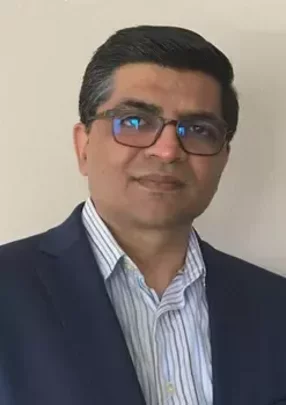
Punit Shah
Vice President Supply Chain and Procurement Officer
Punit Shah is the VP of supply chain and procurement officer at APTIM. Having been in the role for two years, Shah is an engineer by trade and has been a practising supply chain professional for the better part of the last 16 years, garnering experience in a diverse range of industries, including manufacturing, refining, IT hardware, consulting, oilfield services, and EPC companies.
“I have an undergraduate and a graduate degree in mechanical engineering. So I started out my professional career as an engineer and transitioned to supply chain, which was a conscious decision because I went to school for a business degree in supply chain,” Shah says.
Shah came to APTIM after a boss from a prior company brought him on to fill out his team to lead the Supply Chain function for Capital Projects. About three months in, that role was expanded, and Shah took on the Supply Chain responsibility for supporting APTIM’s full business. Given his vast experience, supply chain expertise, and proven track record for turning around supply chain departments and leveraging his engineering background to devise solutions to business problems, Shah seemed like just the right fit to help guide the company through times of change.
Shah explains, “The industry has changed tremendously, obviously being construction management focused, our business is driven by the CapEx budgets of much larger organisations and how they're allocating monies into expansions, building new or repairing old plants. In recent years with the change in direction for the energy industry in general, transitioning from fossils and really starting to more serious about alternate and renewables, we are in the middle of a very significant transition.”
“In my previous roles, I had performed a wide array of jobs. I've been on the Engineering, Procurement and Construction (EPC) side, but I've also been a consultant, and I've also been on the manufacturing side. So I've been able to take that broader supply chain experience and shape it into something that was more relevant to the company.”
Shah believes in leading with a people-first approach. “Leadership drives culture. The leaders and how they conduct and carry themselves and the values that they invite and the vision they set for the company really then drives behaviour further down, and so it is up to the leadership to give the company that direction and that builds a culture for every tier of employees from there on down. I consider it part of my job to take their view and values and translate it to what makes sense to my team and cascade further down.
“Empathy is very big for me. Not losing the human factor and aspect of business. We are here working together professionally, but we are still human beings with families, and we are all kind of going through our own versions of a very difficult and trying time. It's additionally complex because our industry was already in a mode of a very key transition, and then all of these extra external things came along. So to me, it’s very important to ensure leaders understand that aspect. The people are what make our business. So we need to make them a priority to support and be there for our people in order for them to be able to be there for the business.”
As for whether there were any pivotal moments or lucky strikes that changed the course of Shah’s career, he says, “A very lucky one as you would call it, that actually brought me to this industry. Seven years ago, I was a consultant and an EPC firm happened to be a client, and I had a very good break where I had an opportunity to go into the industry as an outsider and really study the process. I was getting paid to study the business in a sense, but it turned out to be a really lucky break because as I was going through it, the client saw what I was doing and what I was capable of, as I got to work with them very closely for six months. That relationship led them to offer me a full-time position to come work for them, and I was able to transition into the industry by having a platform to show them what I was capable of. And it just kind of led to some really good breaks for me from that point on.” It seems opportunity met talent.
Read the full story HERE
